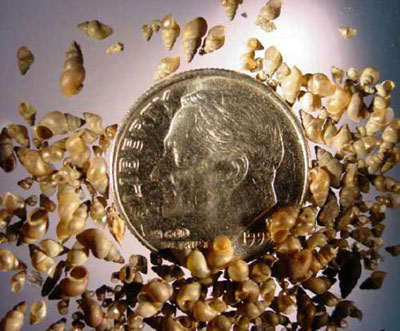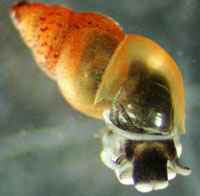Parasites promote 'sex pleasure'
An article published in American Naturalist magazine found that sex evolved in the ' protection ' of parasites.
Although there is a central role in biology, sex still has some evolutionary mystery. Reproduction without ' sex ' like germs, some plants - even some reptiles - seems like a better way to understand. Each individual in the species ' without sex ' (asexual) has the ability to produce his own ' personal ' without having to do ' that '.
 New Zealand mud snail (Potamopyrgus antipodarum) has two fertility simultaneously, one 'needs sex' and one 'does not need sex'.
New Zealand mud snail (Potamopyrgus antipodarum) has two fertility simultaneously, one 'needs sex' and one 'does not need sex'.
Whereas in sexually reproducing species, also called ' need sex ' species, two concentric individuals must be born to produce the next generation. Thus, if theoretically, the ' no sex ' species is capable of multiplying twice (regardless of whether male or female, giving birth to a child). So why is sex a priority strategy, while the ' self-sufficiency ' process is more effective?
 One theory is that parasites that inhibit 'sexless' organisms do not allow these creatures to fulfill their abilities. When an organism 'does not need sex' to give birth to a child, it is nothing more than ' cloning ', to create its own genetic copies.
One theory is that parasites that inhibit 'sexless' organisms do not allow these creatures to fulfill their abilities. When an organism 'does not need sex' to give birth to a child, it is nothing more than ' cloning ', to create its own genetic copies.
Because these versions all have the same genome, when the parasite attacks, it will "die" in a series. If some parasite appears and exploits this ' dangerous ' disadvantage, the parasite can wipe out a species of 'no sex'. In contrast, each individual of the next generation of 'sexually needed' species is a unique genetic unit that is difficult for the parasite to encroach upon, in other words, they only attack a certain number but Can attack all.
Thus, in theory, it is sex that maintains stability for 'sexually needed ' species, and populations of organisms that ' do not need sex ' must cope with extinction due to parasites.
- What happens if all the parasites on Earth disappear?
- 4 types of parasites that are extremely dangerous to eat meat
- Guilty feet
- Unjust award for condoms
- The more parasites live longer
- War also creates pleasure
- Inventing a condom helps increase pleasure
- Handshake brings pleasure like kissing
- These parasites are capable of transgender and controlling other species
- Scientists raise parasites in the body
- Discover how parasites control host behavior
- New way to kill malaria parasites
 Why do potatoes have eyes?
Why do potatoes have eyes? 'Tragedy' the world's largest carnivorous life: Death becomes ... public toilet
'Tragedy' the world's largest carnivorous life: Death becomes ... public toilet Tomatoes were once considered 'poisonous' for 200 years
Tomatoes were once considered 'poisonous' for 200 years Detecting microscopic parasites on human face
Detecting microscopic parasites on human face